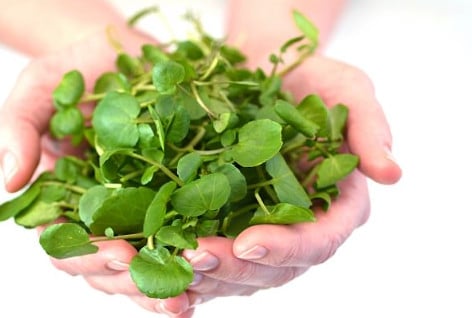Start your day with health news, readers can also read more articles: Who is at high risk of blood clots?; Experts reveal tips for drinking coffee that are good for your health; Is it good to eat durian and drink coca at the same time?...
Vegetables ranked most nutritious by US CDC
According to research published by the US Centers for Disease Control and Prevention (CDC), watercress is the most nutritious vegetable.
A study by the US CDC examined 17 nutrients, including potassium, fiber, protein, calcium... of 41 "most nutritious fruits and vegetables". The results determined that watercress took the number 1 position - with an absolute score of 100/100 .

CDC US announces watercress as the healthiest vegetable
The top 5 rankings of the US CDC include: 2nd place is Chinese cabbage (91.99 points), 3rd place is rainbow chard (89.27 points), 4th place is beetroot (87.08 points), 5th place is spinach (86.43 points).
What gives watercress its crown?
Reduce your risk of developing cancer. Lettuce contains high amounts of antioxidants that help the body fight damage caused by “free radicals.” An imbalance between free radicals and antioxidants may play a role in the development of cancer, according to the National Cancer Institute.
Frances Largeman-Roth, a famous American nutritionist, said: Watercress contains isothiocyanates, which can help prevent cancer by helping the body eliminate potential carcinogens.
Frances Largeman-Roth explains that isothiocyanates have the ability to reduce the activation and enhance the detoxification of carcinogens. Readers can read more about this article on the health page on August 16.
Who is at high risk of blood clots, how to prevent?
Haematologist Dr Pohan Lukito, a blood specialist at Ballarat Cancer Care and Haematology (Australia), shares the dangers of blood clots when traveling long distances.
Blood clots in the legs - called deep vein thrombosis, usually occur in a vein or artery, most commonly in the legs.

Risk of blood clots when traveling long distances
Deep vein thrombosis can have serious consequences if left untreated. A blood clot in a blood vessel can block blood flow and cause blockages in organs.
When it travels to the lungs, it blocks the pulmonary arteries, called a pulmonary embolism. When it reaches the heart, it blocks the arteries in the heart, causing coronary thrombosis, which can lead to a heart attack. The consequences can be fatal .
Patients with suspected thrombosis need to be evaluated very quickly, said Dr. Michael Remetz, a cardiologist at Yale Medicine. If a large part of the heart is affected, the heart will be permanently damaged or can be fatal.
A 2021 study found that sitting on a plane for longer than eight hours increases the risk of blood clots. However, this risk can also occur during long-distance car trips. The next content of this article will be on the health page on August 16 .
Experts reveal tips for drinking coffee that are good for your health
Coffee contains caffeine and other compounds that help increase alertness and improve mood. That's why many people start their day with a cup of coffee.
Here, Dr. Abhinav Singh, a sleep disorder researcher in the US, reveals tips to help you maximize the benefits of coffee.

There are many ways you can maximize the benefits of your cup of coffee.
Lack of sleep, decreased caffeine tolerance, dehydration, altered adenosine levels, or individual differences in caffeine metabolism will reduce the benefits of coffee.
Although coffee increases alertness, it cannot make up for lack of sleep. If you still feel tired despite drinking coffee, you may be sleep deprived.
Studies show that drinking coffee within six hours of bedtime can disrupt sleep, so consider limiting your caffeine intake to the morning and prioritizing sleep-promoting foods at night, according to the Sleep Foundation.
The US Food and Drug Administration (FDA) recommends consuming no more than 400 mg of caffeine per day - equivalent to 4.5 cups of coffee.
Everyone has a different sensitivity to caffeine, so if you notice that caffeine is having a negative effect on you, reduce your intake. Start your day with health news to see more of this article!
Source link


































































































Comment (0)